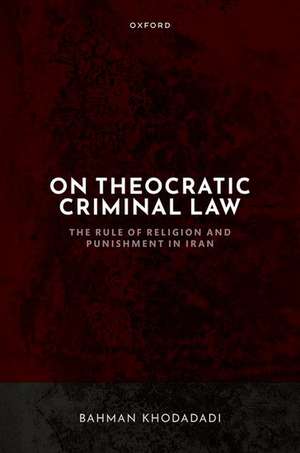On Theocratic Criminal Law: The Rule of Religion and Punishment in Iran
Autor Bahman Khodadadien Limba Engleză Hardback – 24 oct 2024
Preț: 600.57 lei
Preț vechi: 859.82 lei
-30% Nou
Puncte Express: 901
Preț estimativ în valută:
114.92€ • 122.89$ • 95.82£
114.92€ • 122.89$ • 95.82£
Carte disponibilă
Livrare economică 17-24 martie
Preluare comenzi: 021 569.72.76
Specificații
ISBN-13: 9780198888352
ISBN-10: 019888835X
Pagini: 320
Dimensiuni: 162 x 240 x 22 mm
Greutate: 0.64 kg
Editura: OUP OXFORD
Colecția OUP Oxford
Locul publicării:Oxford, United Kingdom
ISBN-10: 019888835X
Pagini: 320
Dimensiuni: 162 x 240 x 22 mm
Greutate: 0.64 kg
Editura: OUP OXFORD
Colecția OUP Oxford
Locul publicării:Oxford, United Kingdom
Recenzii
This is an impressive achievement. In addition to providing us with a much needed account of Iranian criminal law and criminal justice, Khodadadi also develops the concept of theocratic criminal law to analyse the combination of religious beliefs, constitutional doctrine and politics that has shaped contemporary Iranian criminal law. This is an important contribution both to comparative criminal law and to criminal law theory.
Bahman Khodadadi's courageous, interdisciplinary, wide-ranging, and precise work uses a case study, the Islamic Republic of Iran, to demonstrate a theocratically based, yet formally modern legal system as an ideal-typical counter-model to the liberal rule of law. He shows what functions a theocratic and thus ultimately totalitarian criminal law, which aims to equate crime with sin, assumes as an instrument of domination and discipline - a great and important book.
A fascinating, historically informed, critical analysis of Iran's theocratic criminal law. Khodadadi explores its grounding in a theocratic constitution, and its uneasy relationship with ideas of human rights and the rule of law. He provides readers with an illuminating introduction to a criminal law that will be alien to many; he illustrates the political foundations of criminal law, and the different forms that it can therefore take.
Bahman Khodadadi's book, On Theocratic Criminal Law: the Rule of Religion and Punishment in Iran, is a ground-breaking book. Eschewing both sensationalism and apology, Khodadadi's book approaches the criminal justice system in the Islamic Republic of Iran systematically, both from the internal perspective of the theological, juridical and ideological premises of the Islamic Republic of Iran, and the external perspective of liberal legal theory.
The idea of a constitutional theocracy might seem oxymoronic to some, but Khodadadi offers a thoughtful and subtle study of the ways in which Iran's theocracy - like many other authoritarian systems - uses constitutionalism and law to deepen its ideological and institutional hold on the society it governs. Through meticulous research on the Islamic Republic's criminal law system, he provides an original and insightful analysis of the role criminal law (and punishment) as a central mechanism in maintaining theocratic domination... The book makes a major contribution towards our understanding of the development of the post-revolutionary Iranian legal system and offers a revealing critical analysis of the contradictions shot through Iran's principle of legality.
Bahman Khodadadi's courageous, interdisciplinary, wide-ranging, and precise work uses a case study, the Islamic Republic of Iran, to demonstrate a theocratically based, yet formally modern legal system as an ideal-typical counter-model to the liberal rule of law. He shows what functions a theocratic and thus ultimately totalitarian criminal law, which aims to equate crime with sin, assumes as an instrument of domination and discipline - a great and important book.
A fascinating, historically informed, critical analysis of Iran's theocratic criminal law. Khodadadi explores its grounding in a theocratic constitution, and its uneasy relationship with ideas of human rights and the rule of law. He provides readers with an illuminating introduction to a criminal law that will be alien to many; he illustrates the political foundations of criminal law, and the different forms that it can therefore take.
Bahman Khodadadi's book, On Theocratic Criminal Law: the Rule of Religion and Punishment in Iran, is a ground-breaking book. Eschewing both sensationalism and apology, Khodadadi's book approaches the criminal justice system in the Islamic Republic of Iran systematically, both from the internal perspective of the theological, juridical and ideological premises of the Islamic Republic of Iran, and the external perspective of liberal legal theory.
The idea of a constitutional theocracy might seem oxymoronic to some, but Khodadadi offers a thoughtful and subtle study of the ways in which Iran's theocracy - like many other authoritarian systems - uses constitutionalism and law to deepen its ideological and institutional hold on the society it governs. Through meticulous research on the Islamic Republic's criminal law system, he provides an original and insightful analysis of the role criminal law (and punishment) as a central mechanism in maintaining theocratic domination... The book makes a major contribution towards our understanding of the development of the post-revolutionary Iranian legal system and offers a revealing critical analysis of the contradictions shot through Iran's principle of legality.
Notă biografică
Bahman Khodadadi is an associate research scholar at Yale Law School, specialising in criminal law theory, Islamic jurisprudence, sociology of Law, and the development of Islamic law in the modern era. He pursued his doctoral thesis at the Law Faculty of the University of Münster, where he graduated with the highest distinction (summa cum laude). He is the recipient of the DAAD Award for 2016 and 2023 and is the recipient of the “Harry Westermann Award” from the University of Münster - an award that is granted to the best doctoral dissertation in the Law Faculty each year.
